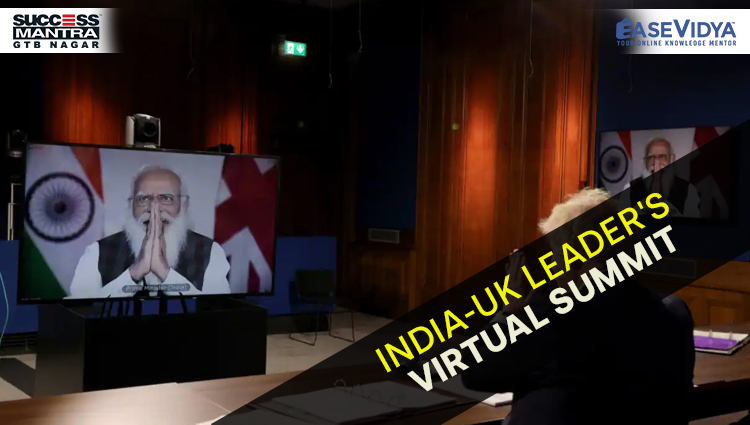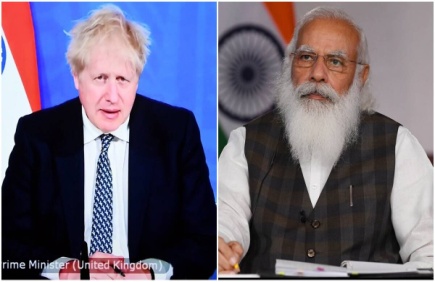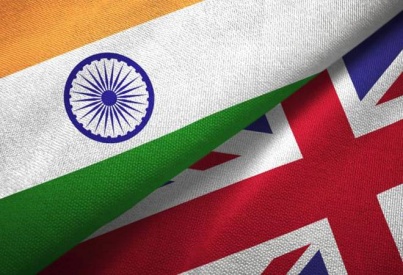
INDIA & UK LEADER'S VIRTUAL SUMMIT
INDIA & UK LEADER'S VIRTUAL SUMMIT
Recently, the Prime Ministers of India and the United Kingdom (UK) held a bilateral virtual summit.India thanked the UK for the prompt medical assistance provided by it in the wake of the severe second wave of Covid-19 in India.
ADOPTED 'ROADMAP 2030'

It will elevate bilateral ties to a “Comprehensive Strategic Partnership”. It will provide a framework for UK-India relations across health, climate, trade, education, science and technology, and defence. This will expand the UK-India health partnership to enhance global health security and pandemic resilience. This includes firming up international supply chains to ensure critical medicines, vaccines and other medical products reach those who need them most. Agreed to expand the existing UK-India vaccines partnership.
Launched Enhanced Trade Partnership: It envisages facilitating market access in specific sectors. It will see Britain open up its fisheries sector to more Indian players, facilitate more opportunities for nurses, recognise Indian seafarers’ certificates and enter into a joint dialogue on a social security agreement. In return, India lifted restrictions to enable British fruit producers to export their produce to the country and improved access for medical devices. They will also work towards reciprocal opening up of legal services. Announced their intent to negotiate a comprehensive Free Trade Agreement (FTA), including consideration of an interim trade agreement to deliver early gains. Set an ambitious target of more than doubling bilateral trade by 2030.
INDIA-UK 'GLOBAL INNOVATION PARTNERSHIP'

The UK is India's second largest partner in research and innovation collaborations. The new partnership aims to support the transfer of inclusive Indian innovations to select developing countries, starting with Africa.
Security & Defence: Cooperation on Maritime Domain Awareness: This includes new agreements on maritime information sharing, an invitation to the UK to join India’s Information Fusion Centre in Gurgaon and an ambitious exercise programme which includes joint trilateral exercises.
UK’s Carrier Strike Group: The UK’s Carrier Strike Group will visit India later this year to boost ties with Indian navies and air forces, undertaking joint training exercises to enable future cooperation on operations in the Western Indian Ocean (UK's Indo-Pacific Tilt).
Light Combat Aircraft Mark 2: To support India’s indigenous development of the Light Combat Aircraft Mark 2.
Potential Collaborations: Discussed the potential for further industrial collaboration in areas such as maritime propulsion, space and cyber, marking the start of a promising new era of UK-India research, capability and industrial collaboration on Indian combat air and beyond.
Migration: Enhance their migration relationship, to make it easier for British and Indian nationals to live and work in each other’s countries. Welcomed the signing of the India-UK Migration and Mobility Partnership (MMP) that is aimed at reducing illegal immigration into the UK. The issue of illegal immigration had been a sticking point between both sides for years. However it is understood that MMP will help genuine immigrants and students and will reduce immigration-related crimes.
Climate Change: Agreed to work together to ensure an ambitious outcome at Conference of the Parties (COP) 26 and expand the UK-India partnership on tackling climate change, including by accelerating the development of clean energy and transport and new technology, protecting nature and biodiversity and helping developing countries adapt to the impact of climate change.
Bilateral Military Exercises
Air Force Exercise ‘Indradhanush’.
Navy Exercise Konkan.
Army Exercise ‘Ajeya Warrior’
India will elevate to a 21st century superpower. It will soon be ‘one of the biggest influences on the world’. It is looking for new partners in the global race. This represents a great opportunity for the UK. The UK has much to offer India in education, research, civil society and the creative sector.
Further, India’s skilled labour, technological assistance and the vibrant market will open a lot of avenues for Britain which has recently parted ways with the European Union.
INDIA-UK NEEDING EACH OTHER

Rise of India: India is undergoing a transition that could have significant consequences for the UK. India is already the third largest economy in the world (at purchasing power parity exchange rates) and is expected to become the second largest in the coming decades. As its economy is transformed, its political, military and cultural power is also likely to increase, elevating India to a 21st Century superpower. As Jim O’Neill has written, India will soon be ‘one of the biggest influences on the world’. It is looking for new partners in the global race. This represents a great opportunity for the UK.
Re-surging UK: UK has much to offer India in education, research, civil society and the creative sector. The massive growth of India’s English-speaking middle classes offers a critical window of opportunity for the UK to become a partner of choice for trade, diplomacy, culture and education before India’s next generation turns its attention elsewhere.
ASSOCIATED CHALLENGES IN UK-INDIA RELATIONSHIP
While India’s relations with countries as different as the US and France have dramatically improved in recent years, ties with Britain have lagged. Following reasons can be cited for this:
Colonial Prism: One reason for this failure has been the colonial prism that has distorted mutual perceptions. Anti-colonial resentment against Britain is always seething barely below the surface among the Indian political and bureaucratic classes. Britain has found it difficult to shed its own prejudices about India.
Legacy of Partition: The bitter legacies of the Partition and Britain’s perceived tilt to Pakistan have long complicated the engagement between India and the UK. Further, many former Prime Ministers of Indian have accused Britain of creating the Kashmir problem.
Recent Attitude of the Labour Party: While there is no way of fully separating South Asian and British domestic politics, India’s problems have been accentuated by the British Labour Party’s growing political negativity towards India. The Labour Party had become rather hostile on India’s internal matters, including on Kashmir.
India will elevate to a 21st century superpower. It will soon be ‘one of the biggest influences on the world’. It is looking for new partners in the global race. This represents a great opportunity for the UK. The UK has much to offer India in education, research, civil society and the creative sector.
Further, India’s skilled labour, technological assistance and the vibrant market will open a lot of avenues for Britain which has recently parted ways with the European Union.












0 Comment